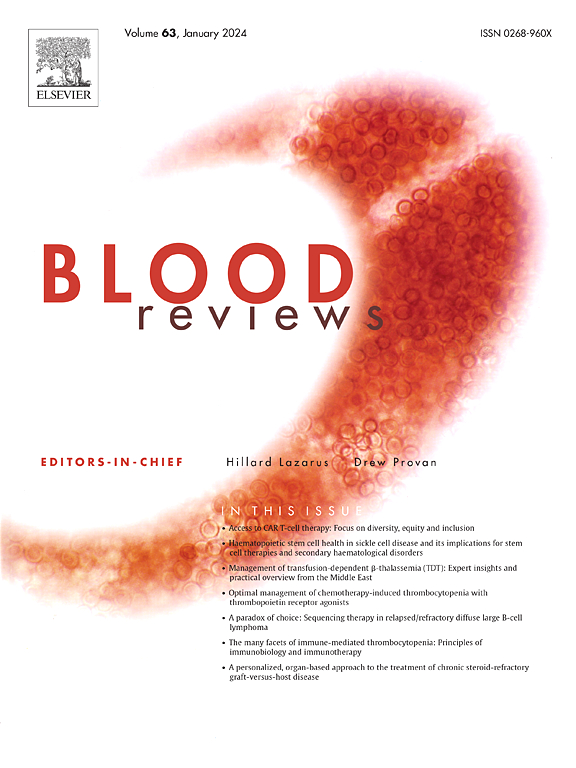推进 CAR T 细胞疗法:血液恶性肿瘤的临床前研究和临床转化。
IF 5.7
2区 医学
Q1 HEMATOLOGY
引用次数: 0
摘要
嵌合抗原受体(CAR)T 细胞疗法在血液恶性肿瘤患者中取得了显著的成功,获得了持久和潜在的治疗效果。CAR 是一种定制的融合蛋白,能引导 T 细胞找到肿瘤细胞上的特定抗原,从而引起靶向免疫反应。几种 CD19 靶向 CAR T 细胞疗法获得批准后,涉及 CAR T 细胞疗法治疗血液恶性肿瘤的临床试验明显激增。尽管在了解 CAR T 细胞疗法的相关反应机制、耐药模式和不良事件方面取得了进展,但将这些见解转化为强大的临床疗效,在临床试验和现实世界中都显示效果一般。因此,通过严格的临床前研究来评估 CAR T 细胞的功能,对于完善临床应用的治疗策略起着至关重要的作用。本综述概述了用于评估 CAR T 细胞功能的各种体外和动物模型。我们讨论了涉及已获批准的 CAR T 细胞产品的临床前研究结果,以及近期旨在优化 CAR T 细胞功能的临床前研究产生的影响。这篇综述强调了临床前评估的重要性,以及需要能准确复制人类疾病的模型来缩小临床前成功与临床疗效之间的差距。本文章由计算机程序翻译,如有差异,请以英文原文为准。
Advancing CAR T-cell therapies: Preclinical insights and clinical translation for hematological malignancies
Chimeric antigen receptor (CAR) T-cell therapy has achieved significant success in achieving durable and potentially curative responses in patients with hematological malignancies. CARs are tailored fusion proteins that direct T cells to a specific antigen on tumor cells thereby eliciting a targeted immune response. The approval of several CD19-targeted CAR T-cell therapies has resulted in a notable surge in clinical trials involving CAR T cell therapies for hematological malignancies. Despite advancements in understanding response mechanisms, resistance patterns, and adverse events associated with CAR T-cell therapy, the translation of these insights into robust clinical efficacy has shown modest outcomes in both clinical trials and real-world scenarios. Therefore, the assessment of CAR T-cell functionality through rigorous preclinical studies plays a pivotal role in refining therapeutic strategies for clinical applications. This review provides an overview of the various in vitro and animal models used to assess the functionality of CAR T-cells. We discuss the findings from preclinical research involving approved CAR T-cell products, along with the implications derived from recent preclinical studies aiming to optimize the functionality of CAR T-cells. The review underscores the importance of robust preclinical evaluations and the need for models that accurately replicate human disease to bridge the gap between preclinical success and clinical efficacy.
求助全文
通过发布文献求助,成功后即可免费获取论文全文。
去求助
来源期刊

Blood Reviews
医学-血液学
CiteScore
13.80
自引率
1.40%
发文量
78
期刊介绍:
Blood Reviews, a highly regarded international journal, serves as a vital information hub, offering comprehensive evaluations of clinical practices and research insights from esteemed experts. Specially commissioned, peer-reviewed articles authored by leading researchers and practitioners ensure extensive global coverage across all sub-specialties of hematology.
 求助内容:
求助内容: 应助结果提醒方式:
应助结果提醒方式:


